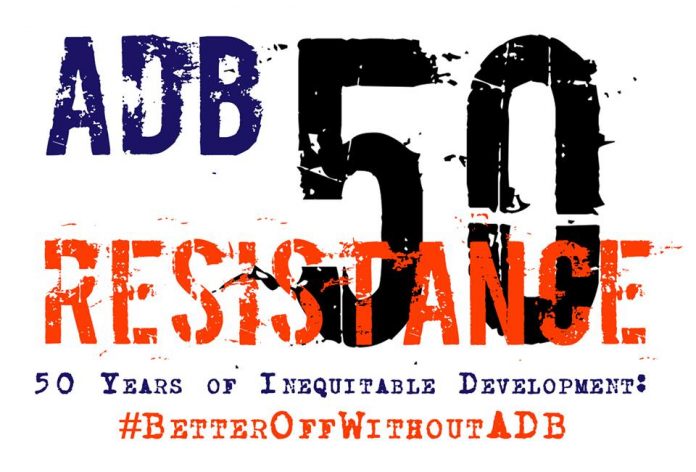TCN News
New Delhi: People’s movements and other civil society organisations across India would hold over 100 actions of protest in 21 states of the country from May 1 to May 7, 2017 to mark the 50th anniversary of the establishment of the Asian Development Bank (ADB), highlighting the gross human rights violations, loss of livelihood, and environmental destruction caused by the ‘development model’ being pushed by ADB and other international financial institutions (IFIs), using public money.
The during the first week of the May, the organisations will hold multiple programs to expose the ADB’s neo-liberal capitalist model of growth, where public money was used to promote private corporations, and its failed development paradigm, through raising the larger issues related to issues of accountability and transparency of ADB and other IFIs.
Shaktiman Ghosh, General secretary National Hawker Federation said, “The model of development pushed ahead by ADB resulted in the loss of livelihood and forced eviction, pushing people to poverty, contradicting ADB’s stated motto of ‘fighting poverty’ In urban areas, the hawkers are the badly hit ones. However with increasing privatization of services, even the middle class will not be spared.”
Some of the programs being organized during the occasion range from organizing protests, public talks or lecture series to highlight the serious impacts of ADB’s lending, at a time when ADB is celebrating 50 years of expanding its lending portfolio of just over $3 billion during the first decade, to $123 billion during the last decade.
The programs are geographically spread from Bilaspur in Himachal Pradesh to Thiruvananthapuram in Kerala, and to the Mundra in Gujarat to Dibrugarh in Assam. While Peoples’ Forum Against IFIs, a platform of people’s movements and civil society organisations working on the ill effects of international financing, is the one coordinating these 100+ events, the actions are organised by local organisations in a manner which is relevant to them, to highlight their struggles / issues and seek transparency and accountability from IFIs.
“ADB needs to seriously review its push for hydro-projects in India, particularly in the Himalayas, in the name of clean energy program in the light of the adverse environmental and social fallouts of its projects and the complete failure of its safeguard policies in this context,” Manshi Asher of Himdhara – Environment Research and Action Collective said.
“Further, the escalation of costs in these projects has put a question mark on the financial feasibility of hydro power projects,” she added.
ADB’s investments resulting in undermining local governance bodies and other traditional institutions has come to the fore time and again. “The arrogance with which the destruction of cultures and communities by way of bulldozing our rights and the condescending belief that we indigenous peoples of the North-East are uniformed enough to be auctioning our rights and our way of living to the highest ‘development’ bidder like the IFIs such as ADB, needs to be done away with. We are not stupid and we will do our best to protect our land and culture!” Ratika Yumnam of Indigenous Perspectives, Manipur said.
Highlighting the disproportinate influence IFIs have on the policies and other lending agencies, Leo Saldhana of Environmental Support Group Bangalore said, “ADB has always played the role of influencing a form of development that ensures revenue from loan recipient countries flows out to the coffers of countries that control the bank’s stocks. For instance, ADB pushed for Metro projects in India, and after these super-expensive mega projects were well on their way but without serving the real need – of addressing public transport, the bank backed out.
“The way had already been paved of Japan Bank and JICA to step in to finance the Metro project, as is the case in Bangalore. Interestingly, the project has 300% cost over-runs and is yet not functional. Meanwhile, the entire city has been reduced to a mess of what it was before: India’s ‘garden city’, but not any more!”
Coastal Gujarat Power Ltd (Tata Mundra) a $4bn, 4000 MW coal based thermal power plant in Kutch Gujarat is one the projects ADB is co-financing, causing damage to people and environment. As confirmed by its own accountability mechanism, Complaiance Review Panel, the project has violated ADB’s policies on consultation with communities, the sanctioning of the project was based on errorfull social impact assessment and due to the project the fish catch has reduced drastically, threatening the livelihood of thousands of fishworkers.
“Our plea to ADB to restore the livelihood of the fishworkers have fell on deaf ears. While they are celebrating the 50 years, the fishworkers in Mundra are struggling to meet their ends,” Bharat Patel, General Secretary of Machimar Adhikaar Sangharsh Sangathan said.
Through these 100+ actions, people’s movements and other CSOs are demanding the ADB to mend their ways of lending, be transparent and accountable to people in whose name they run their business. Failing which, people will be left with no option than to strengthen their struggles, despite repressive laws curbing their right to dissent, freedom of expression and freedom of assembly.


